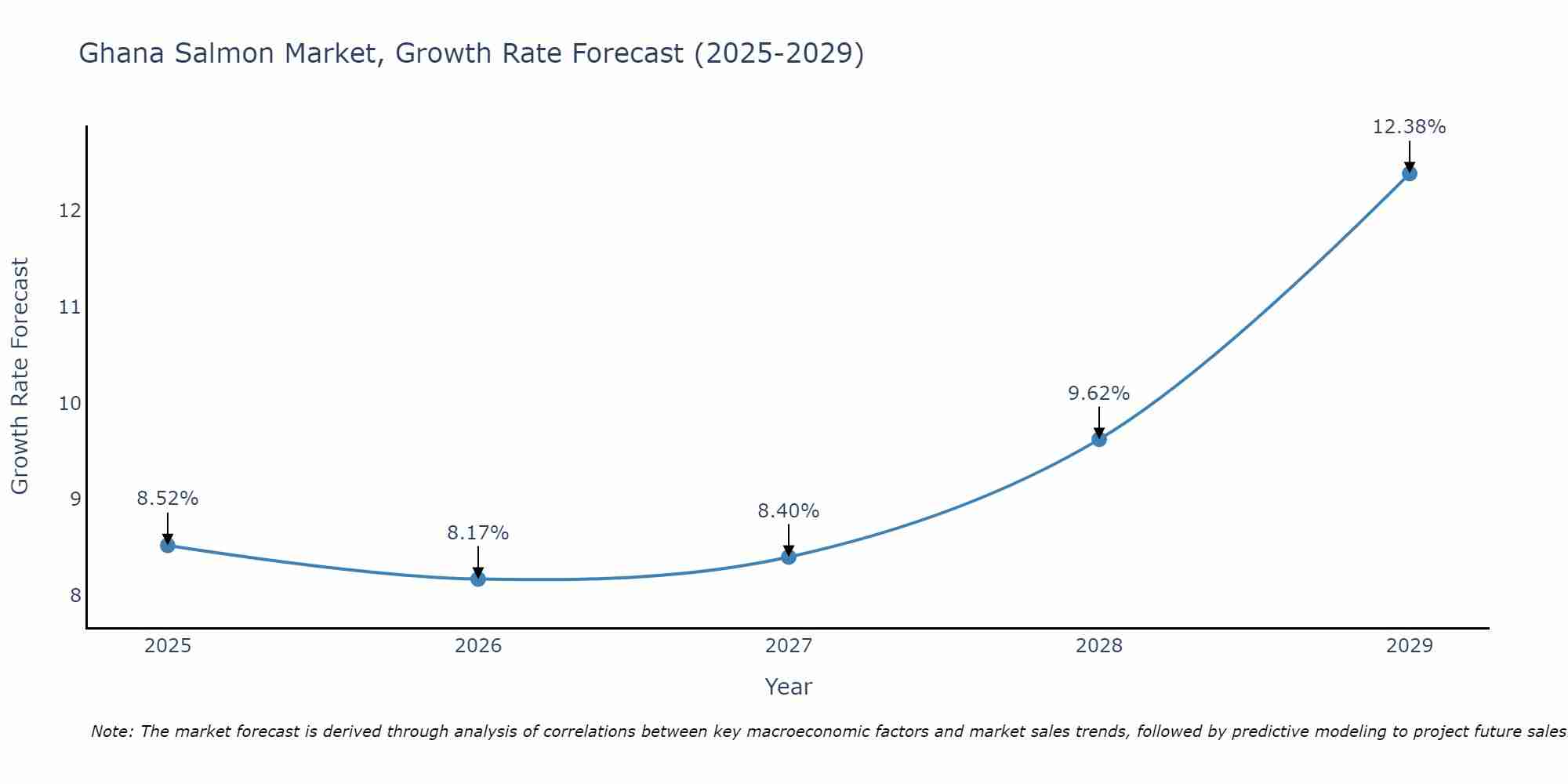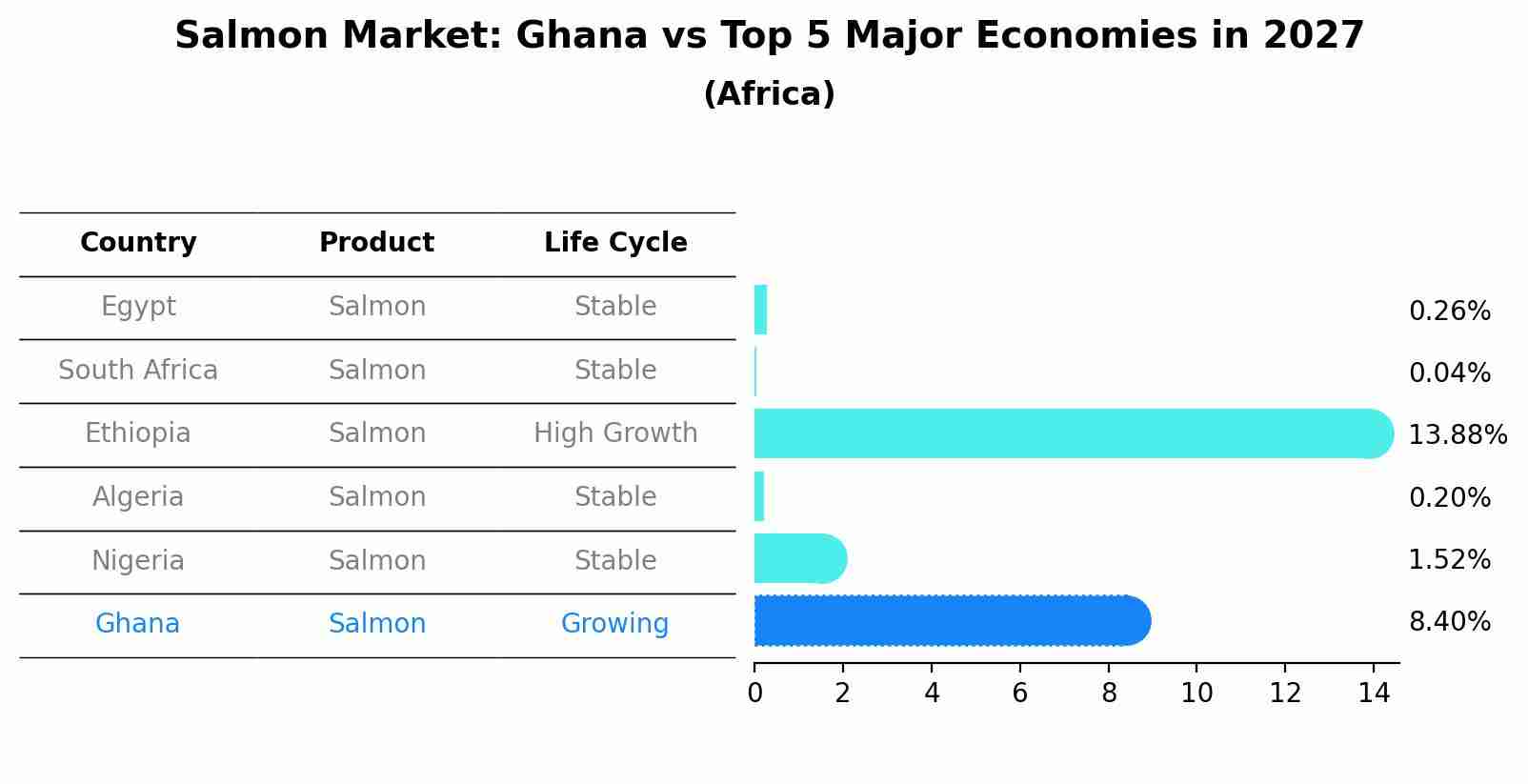Ghana Salmon Market (2025-2031) Outlook | Size, Companies, Growth, Forecast, Trends, Revenue, Value, Industry, Analysis & Share
| Product Code: ETC387656 | Publication Date: Aug 2022 | Updated Date: Jul 2025 | Product Type: Market Research Report | |
| Publisher: 6Wresearch | Author: Summon Dutta | No. of Pages: 75 | No. of Figures: 35 | No. of Tables: 20 |
Ghana Salmon Market Size Growth Rate
The Ghana Salmon Market is projected to witness mixed growth rate patterns during 2025 to 2029. From 8.52% in 2025, the growth rate steadily ascends to 12.38% in 2029.

Salmon Market: Ghana vs Top 5 Major Economies in 2027 (Africa)
The Salmon market in Ghana is projected to grow at a growing growth rate of 8.40% by 2027, within the Africa region led by Egypt, along with other countries like South Africa, Ethiopia, Algeria and Nigeria, collectively shaping a dynamic and evolving market environment driven by innovation and increasing adoption of emerging technologies.

Ghana Salmon Market Synopsis
The Ghana Salmon Market is a niche segment within the country`s seafood industry, characterized by the growing demand for high-quality imported salmon products. While traditional Ghanaian cuisine primarily revolves around fresh fish varieties, the increasing influence of Western food trends and a growing middle-class population has led to a rise in the consumption of salmon. Imported salmon is perceived as a premium product, often favored by upscale restaurants, hotels, and expatriates in urban areas like Accra. The market is primarily supplied by imports from countries like Norway, Scotland, and Chile, with key distribution channels including supermarkets, specialty seafood stores, and online platforms. Despite being a relatively small market compared to other seafood categories, the Ghana Salmon Market is poised for further growth as consumer preferences evolve and economic conditions continue to improve.
Ghana Salmon Market Trends
The Ghana Salmon Market is experiencing a growing demand for high-quality seafood products due to increasing consumer awareness of the health benefits associated with salmon consumption. Consumers are seeking out salmon for its rich source of omega-3 fatty acids and high protein content. There is also a trend towards sustainability and responsible sourcing practices, with consumers showing a preference for salmon that is sourced from well-managed fisheries or certified as sustainable. Additionally, the rising popularity of international cuisines and the influence of global food trends are driving the demand for salmon in Ghana, particularly among urban populations and expatriates. As a result, there is a growing presence of imported salmon products in supermarkets and restaurants, offering a variety of options for consumers looking to incorporate salmon into their diets.
Ghana Salmon Market Challenges
One of the main challenges faced in the Ghana Salmon Market is the high cost of imported salmon due to transportation and import duties. This results in elevated prices for consumers, making salmon less accessible to the general population. Additionally, the lack of local salmon production in Ghana further exacerbates the issue of high prices and limited availability. Another challenge is the competition from other affordable protein sources such as fish species that are locally sourced and more affordable for consumers. Inadequate cold chain infrastructure and storage facilities also pose challenges in maintaining the quality and freshness of imported salmon in the market. Overall, these factors contribute to the limited growth and penetration of salmon in the Ghanaian market.
Ghana Salmon Market Investment Opportunities
The Ghana Salmon Market presents promising investment opportunities due to the increasing demand for seafood products in the country. With a growing middle-class population and changing consumer preferences towards healthier food options, there is a rising interest in salmon consumption. Investing in salmon farming operations or distribution channels in Ghana can be lucrative as it allows investors to capitalize on this demand. Additionally, the government`s efforts to promote aquaculture and improve infrastructure in the fisheries sector further support the growth potential of the salmon market in Ghana. However, challenges such as import regulations, competition, and sustainability practices should be carefully considered before making investment decisions in this sector.
Jordan Agar Market Government Policies
The Ghanaian government has implemented various policies to regulate the salmon market in the country. These policies aim to ensure sustainable fishing practices, protect the marine ecosystem, and promote the growth of the aquaculture industry. Some key regulations include licensing requirements for fishing vessels, restrictions on fishing in certain areas to prevent overfishing, and the establishment of quotas to control the amount of salmon that can be harvested. Additionally, the government has introduced measures to promote local processing and value addition to boost the competitiveness of Ghana`s salmon industry. Overall, these policies reflect the government`s commitment to balancing economic development with environmental conservation in the salmon market.
Ghana Salmon Market Future Outlook
The future outlook for the Ghana Salmon Market appears promising due to increasing consumer demand for healthy and protein-rich food options. With a growing middle-class population and rising awareness of the health benefits of salmon consumption, there is a potential for sustained growth in the market. Additionally, advancements in technology and logistics are expected to improve the accessibility and affordability of salmon products in Ghana. However, challenges such as import costs, regulatory barriers, and competition from local fish products may impact market expansion. Overall, the Ghana Salmon Market is likely to experience steady growth in the coming years, driven by changing consumer preferences and a growing economy.
Key Highlights of the Report:
- Ghana Salmon Market Outlook
- Market Size of Ghana Salmon Market, 2024
- Forecast of Ghana Salmon Market, 2031
- Historical Data and Forecast of Ghana Salmon Revenues & Volume for the Period 2021 - 2031
- Ghana Salmon Market Trend Evolution
- Ghana Salmon Market Drivers and Challenges
- Ghana Salmon Price Trends
- Ghana Salmon Porter's Five Forces
- Ghana Salmon Industry Life Cycle
- Historical Data and Forecast of Ghana Salmon Market Revenues & Volume By Type for the Period 2021 - 2031
- Historical Data and Forecast of Ghana Salmon Market Revenues & Volume By Chinook Salmon for the Period 2021 - 2031
- Historical Data and Forecast of Ghana Salmon Market Revenues & Volume By Coho Salmon for the Period 2021 - 2031
- Historical Data and Forecast of Ghana Salmon Market Revenues & Volume By Pink Salmon for the Period 2021 - 2031
- Historical Data and Forecast of Ghana Salmon Market Revenues & Volume By Red Salmon for the Period 2021 - 2031
- Historical Data and Forecast of Ghana Salmon Market Revenues & Volume By Salmo Salar for the Period 2021 - 2031
- Historical Data and Forecast of Ghana Salmon Market Revenues & Volume By Silverbrite Salmon for the Period 2021 - 2031
- Historical Data and Forecast of Ghana Salmon Market Revenues & Volume By End Product Type for the Period 2021 - 2031
- Historical Data and Forecast of Ghana Salmon Market Revenues & Volume By Fresh for the Period 2021 - 2031
- Historical Data and Forecast of Ghana Salmon Market Revenues & Volume By Frozen for the Period 2021 - 2031
- Historical Data and Forecast of Ghana Salmon Market Revenues & Volume By Canned for the Period 2021 - 2031
- Historical Data and Forecast of Ghana Salmon Market Revenues & Volume By Others for the Period 2021 - 2031
- Historical Data and Forecast of Ghana Salmon Market Revenues & Volume By Distribution Channel for the Period 2021 - 2031
- Historical Data and Forecast of Ghana Salmon Market Revenues & Volume By Retail Stores for the Period 2021 - 2031
- Historical Data and Forecast of Ghana Salmon Market Revenues & Volume By Hypermarket/supermarket for the Period 2021 - 2031
- Historical Data and Forecast of Ghana Salmon Market Revenues & Volume By Online Sales Channels for the Period 2021 - 2031
- Ghana Salmon Import Export Trade Statistics
- Market Opportunity Assessment By Type
- Market Opportunity Assessment By End Product Type
- Market Opportunity Assessment By Distribution Channel
- Ghana Salmon Top Companies Market Share
- Ghana Salmon Competitive Benchmarking By Technical and Operational Parameters
- Ghana Salmon Company Profiles
- Ghana Salmon Key Strategic Recommendations
Frequently Asked Questions About the Market Study (FAQs):
- Single User License$ 1,995
- Department License$ 2,400
- Site License$ 3,120
- Global License$ 3,795
Search
Thought Leadership and Analyst Meet
Our Clients
Related Reports
- Canada Oil and Gas Market (2026-2032) | Share, Segmentation, Value, Industry, Trends, Forecast, Analysis, Size & Revenue, Growth, Competitive Landscape, Outlook, Companies
- Germany Breakfast Food Market (2026-2032) | Industry, Share, Growth, Size, Companies, Value, Analysis, Revenue, Trends, Forecast & Outlook
- Australia Briquette Market (2025-2031) | Growth, Size, Revenue, Forecast, Analysis, Trends, Value, Share, Industry & Companies
- Vietnam System Integrator Market (2025-2031) | Size, Companies, Analysis, Industry, Value, Forecast, Growth, Trends, Revenue & Share
- ASEAN and Thailand Brain Health Supplements Market (2025-2031) | Strategy, Consumer Insights, Analysis, Investment Trends, Opportunities, Growth, Size, Share, Industry, Revenue, Segments, Value, Segmentation, Supply, Forecast, Restraints, Outlook, Competition, Drivers, Trends, Demand, Pricing Analysis, Competitive, Strategic Insights, Companies, Challenges
- ASEAN Bearings Market (2025-2031) | Strategy, Consumer Insights, Analysis, Investment Trends, Opportunities, Growth, Size, Share, Industry, Revenue, Segments, Value, Segmentation, Supply, Forecast, Restraints, Outlook, Competition, Drivers, Trends, Demand, Pricing Analysis, Competitive, Strategic Insights, Companies, Challenges
- Europe Flooring Market (2025-2031) | Outlook, Share, Industry, Trends, Forecast, Companies, Revenue, Size, Analysis, Growth & Value
- Saudi Arabia Manlift Market (2025-2031) | Outlook, Size, Growth, Trends, Companies, Industry, Revenue, Value, Share, Forecast & Analysis
- Uganda Excavator, Crane, and Wheel Loaders Market (2025-2031) | Strategy, Consumer Insights, Analysis, Investment Trends, Opportunities, Growth, Size, Share, Industry, Revenue, Segments, Value, Segmentation, Supply, Forecast, Restraints, Outlook, Competition, Drivers, Trends, Demand, Pricing Analysis, Competitive, Strategic Insights, Companies, Challenges
- Rwanda Excavator, Crane, and Wheel Loaders Market (2025-2031) | Strategy, Consumer Insights, Analysis, Investment Trends, Opportunities, Growth, Size, Share, Industry, Revenue, Segments, Value, Segmentation, Supply, Forecast, Restraints, Outlook, Competition, Drivers, Trends, Demand, Pricing Analysis, Competitive, Strategic Insights, Companies, Challenges
Industry Events and Analyst Meet
Whitepaper
- Middle East & Africa Commercial Security Market Click here to view more.
- Middle East & Africa Fire Safety Systems & Equipment Market Click here to view more.
- GCC Drone Market Click here to view more.
- Middle East Lighting Fixture Market Click here to view more.
- GCC Physical & Perimeter Security Market Click here to view more.
6WResearch In News
- Doha a strategic location for EV manufacturing hub: IPA Qatar
- Demand for luxury TVs surging in the GCC, says Samsung
- Empowering Growth: The Thriving Journey of Bangladesh’s Cable Industry
- Demand for luxury TVs surging in the GCC, says Samsung
- Video call with a traditional healer? Once unthinkable, it’s now common in South Africa
- Intelligent Buildings To Smooth GCC’s Path To Net Zero


















